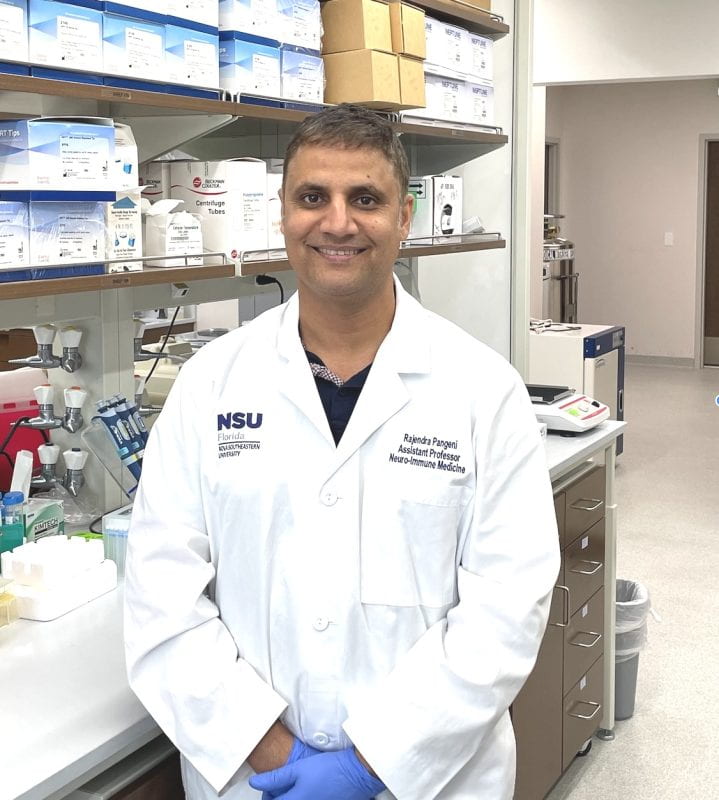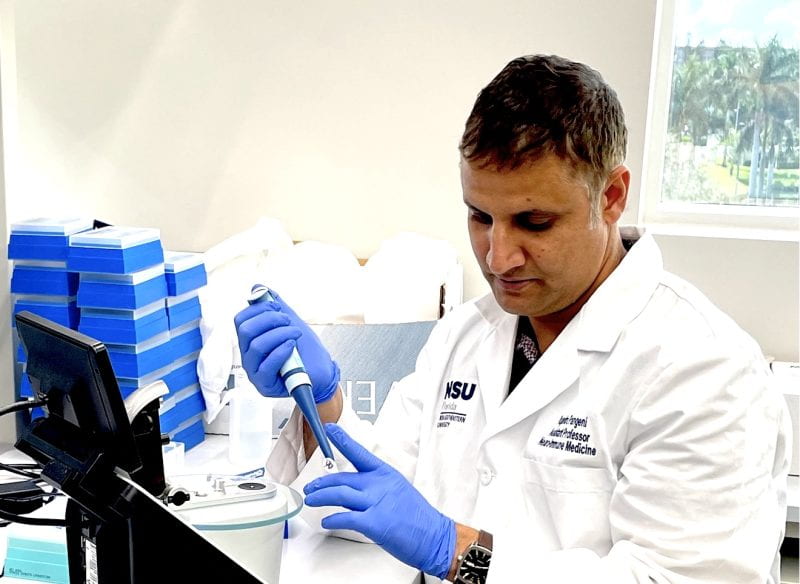PFRDG to Identifying Epigenetic Determinants of Gulf War Illness


Rajendra Pangeni Ph.D. is an Assistant Professor of Genomics in the Dr. Kiran C. Patel College of Osteopathic Medicine who also volunteers as a founding chairman of an Institution called Nexus Institute of Research and Innovation (NIRI) in Nepal. NIRI was established to mentor and teach research skills to youths and students in Nepal and beyond who don’t have access to resources and opportunities for science and higher education.
Tell me briefly about your recent grant-funded project.
This project, titled “Identifying Epigenetic Determinants of Gulf War Illness Using Plasma Cell-Free DNA”, is funded by the Presidential Faculty Research and Development Grant (PFRDG) at NSU. The goal of this project is to look at the epigenetic alterations in genes of Gulf War Illness (GWI) Patients using Cell free DNA from the plasma. GWI doesn’t have diagnostic and prognostic markers at present and identifying genes that have aberrantly switched off or switched on due to epigenetic mechanism (such as DNA methylation) help us to develop the prognostic/diagnostic markers as well as the targets for developing therapy for Gulf war Illness.
Who is working with you on this project?
I am working with Lubov Nathanson Ph.D., Co-Principal Investigator (Co-PI) of this project, Jackson Gamer (DO-student), and Vladimir Beljanski Ph.D. (collaborator) on this project. In addition, I am also working with Bob Speth Ph.D., who is my grant mentor through NSU’s Grant mentoring program. I will be working with NSU Genomics core and other colleagues directly and indirectly as well.
What opportunities and/or benefits does this grant bring to the NSU community?
This grant brings start-of-the-art technology and innovation such as Whole Genome Bisulfite Sequencing (WGBS) and also technology/assays for isolating cell-free DNA from GWI patients’ plasma for DNA methylation studies for the first time to NSU. This is actually being carried out for the first time in GWI patients. This provides opportunities for students to get involved in the projects and to gain skills. I look forward to collaborating with the colleagues at NSU.
How does this project connect with your other work at NSU?
I am a cancer biologist by training, and this project is a continuation of epigenetics research that I have been conducting for the past 10 years right from my PhD. Being relatively a new faculty here, I am still developing my research track at NSU, which would be mainly on Cancer genomics/epigenetics. Therefore, this project, especially the technologies I am using connects with what I am passionate about in my career.

How has NSU helped you pursue and/or achieve personal and professional goals you have set for yourself?
I am enrolled in NSU’s Grant Writing Mentorship Program at present and Dr. Bob Speth is my grant writing mentor through this program. Similarly, I have other opportunities such as faculty development sessions, Institutional talk series (e.g. INIM Monthly seminar series), orientations, ground rounds, workshops, and national and international conferences, etc.
In addition, I am teaching Genetics to Undergraduate students and I am developing a Bioinformatics course to start in Winter 2024. These are a part of my professional goals to transfer my research skills to the new generation of scientists.
What advice do you have for other grant seekers at NSU?
I am a part of NSU’s grant mentoring program as a mentee and I meet with my mentor Dr. Bob Speth and my group leader Dr. Lubov Nathanson regularly to discuss grants and grants collaborations. I have been regularly attending Grant Writing Laboratory workshops and webinars offered by the Office of Sponsored Programs (OSP) within the Division of Research and Economic Development (DoR). These regular meetings throughout the years have been extremely helpful to get ideas on developing the whole grant application, such as developing a one-page project summary, budget preparation, developing hypothesis, formulating aims and research strategies, and finding funding opportunities. Melanie Bauer M.A., the Grant Writing Manager in DoR, has been running these sessions and her support has been extremely helpful. Similarly, Beth Gilbert helps us with revising grant application to make sure that it reads well for peer-reviewing process. NSU has other grant-related resources and exploring those has been really helpful.
What is the next grant proposal or project on your agenda?
I have recently applied for a grant at one of the foundations to work on Glioblastoma, which is one of the most aggressive brain tumor types. I am planning for R21 in Feb 2024 based on the preliminary data I am generating through my existing PFRDG. In addition, I hope to apply for a few more grants within the next year.